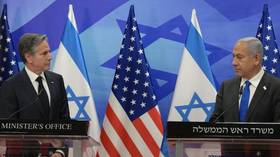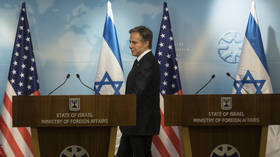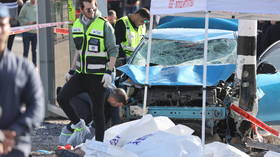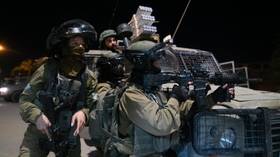The new US plan for calming Palestine-Israel tensions is already failing

The US Biden administration has reportedly presented a plan to cool tensions between Palestinians and Israelis, which have dramatically escalated since the formation of Israel’s new right-wing government.
As reported by Axios, following up on a request made by US secretary of State Antony Blinken, during his visit to the Middle East late last month, his Assistant Secretary of State for Near Eastern Affairs, Barbara Leaf, stayed behind and worked on presenting a roadmap towards preventing a violent escalation in the region. Antony Blinken had urged both Israeli Prime Minister Benjamin Netanyahu and Palestinian President Mahmoud Abbas to “pause” provocative steps in order to avoid further hostilities.
The requests made by the Biden administration were originally geared towards the Palestinian Authority (PA) taking significant steps, whilst minimal requirements were put on the Netanyahu government. Antony Blinken urged Mahmoud Abbas to implement a “security plan” presented by US security coordinator Lt. Gen. Michael Fenzel, who proposed creating a special PA Security Force wing that would be trained by the US to fight Palestinian militias that have formed over the past two years in the Jenin and Nablus areas. Later on, the US also requested that Israel reduce the number of raids on Palestinian towns and refugee camps, in addition to halting their plans for significant settlement expansion; both of which Israel refuses to follow through on.
Rogue militias
In September of 2021, the Jenin Brigades armed group announced its formation out of the Jenin refugee camp, later growing and expanding its areas of operations to the wider Jenin area. The armed group does not have any traceable command-and-control structure. It consists primarily of men between the ages of 18 and 25, mostly formed of members of the Palestinian Islamic Jihad (PIJ) movement and Fatah Party members who are no longer loyal to the ruling clique in the party that commands the Ramallah-based Palestinian Authority. Later, in September of 2022, the Lions’ Den armed movement also announced its formation in the old city of Nablus, claiming to belong to no political party. Due to the rise of newly formed armed groups, which hasn’t happened in the West Bank since the early 2000s, the Palestinian Authority’s security forces have lost control of much of the northern West Bank.
The US proposal for the Palestinian Authority to form a special force to fight against the armed militias is an extremely dangerous intervention in the affairs of the region. It is reminiscent of the UK-backed “peace bands” formed under the British Mandate in the late 1930s, when the British took the initiative to use Palestinians to fight each other. However, unlike then, there is no support for anti-militia activities from the Palestinian public today. In fact, the overwhelming majority support the Jenin Brigades, Lions’ Den and other armed groups, according to all available polling data. The PA has been significantly weakened over the past three years due to a financial crisis, corruption, the lack of any diplomatic breakthroughs, the postponement of national elections, and the killing and detention of Palestinians for the sake of Israeli security.
Third Intifada coming?
The Palestinian Authority has even been engaged in limited armed exchanges with the newly formed militias in the West Bank over the past year, triggering mass protests from angry West Bank residents. The number one issue that Palestinians in the West Bank have with the PA is its ‘security coordination’ with Israel, which essentially means that the PA’s security forces work with the Israeli military, intelligence and border police, in order to combat Palestinian threats against Israelis, but not the other way around. When Israel raided the Jenin refugee camp last month, killing 10 Palestinians, including three civilians, one of whom was an elderly woman, the PA announced the suspension of security coordination in response.
The US assistant secretary of state for Near Eastern affairs met last week with Israel’s National Security Advisor Tzachi Hanegbi, and President Abbas’ senior advisor, Hussein al-Sheikh, to propose that the Palestinian Authority return to security coordination with Israel, in exchange for Israel slowing down settlement expansion. The US also sought for the PA to pause its attempts to take Israel before the International Court of Justice and the UN for alleged war crimes – a move for which the PA has been punished with Israeli sanctions.
Last Thursday, CIA director Bill Burns expressed his concern over the possibility of a ‘third intifada’ [Palestinian uprising] erupting inside the West Bank, stating that “a lot of what we’re seeing today has a very unhappy resemblance to some of those realities that we saw then [during the Second Intifada] too”. His concern is congruent with the reality on the ground, where last year was the deadliest for West Bank Palestinians since the end of the Second Intifada in 2005, according to the United Nations. Palestinian attacks against Israeli settlers and soldiers are also a daily occurrence now.
Two-state solution blocked
Despite the US government clearly identifying the nature of the escalation, it shows complete ignorance of its own role in creating the current hostilities. The bulk of the US secretary of state’s visit to Palestine-Israel was tailored to forwarding Arab-Israeli normalization efforts and to expanding the ‘Negev Forum’, which Morocco, the UAE, Bahrain and Egypt form with Israel, in order to advance their own ties. At the same time, Antony Blinken spoke of reaching a “two-state solution” between Palestinians and Israelis as being the only path to any lasting peace.
Under the Arab Peace Initiative of 2002 (also known as the Saudi Initiative), a “two-state solution” (meaning the recognition by Israel of a Palestinian state and the end of occupation of Palestinian territories) is a precondition for the normalization of ties between Israel and Arab states. By pushing for normalization without that precondition, Blinken effectively seeks to deprive the Palestinian Authority of its best bargaining chip and leaves it powerless to extract any concessions from the Israeli government, whose officials will not even consider sitting down for meetings with their Palestinian counterparts.
Israeli Prime Minister Benjamin Netanyahu has already stated that he is not willing to halt settlement expansion, as proposed by the US government, with Israel’s Finance Minister, Bezalel Smotrich, openly announcing that there will be no freeze on settlement construction, which is considered illegal by the UN and most world powers. Israel has also announced its intention to increase raids and further military activities in the West Bank, in what it deems to be a preparation for likely hostilities during the Muslim Holy month of Ramadan.
Hope for Palestinians is the only way to peace
Despite the PA having announced the end of its security coordination with Israel, it is clear that some coordination is still occurring and that the announcement was more of a public relations move for President Abbas, who is feeling the pressure from a disgruntled Palestinian population. This in itself is a key indicator that the PA is feeling the pressure from Palestinian society at large and a sign that any US-trained PA force to combat the militia groups could lead to a disaster, whereby the Ramallah-based authority could even be overthrown due to the outrage such a step would cause. When the CIA worked to create the “new PA security force” during the latter years of the Second Intifada, it only worked after the PA itself had participated in the fight against the Israeli military and still maintained some degree of popular support. In addition to this, the Israeli army had conducted ‘Operation Defensive Shield,’ which led to the assassinations or arrests of the most prominent militia leaders inside the West Bank.
The only way the PA could possibly regain control of Jenin and Nablus is by proving to the Palestinian people that it is on their side, and not fighting for the US and Israel. It is also the reality that many of the leading fighters in the militia groups, especially in Jenin, are actually members of the PA’s security forces that have gone rogue. Armed militias also seem to be forming in areas like Bethlehem, al-Khalil and even Jericho, which proves that the re-emergence of the armed struggle in the West Bank is not only limited to the north of the territory.
The only way to properly combat the escalation and to stop this from growing into a much larger confrontation, is to provide hope for the Palestinian people inside the West Bank, something that the US will not even consider. Instead of the US working as an objective mediator, it works solely for Israel’s immediate interests and accepts the political restraints of each Israeli government as an excuse for repeatedly violating its own red lines. The US considers every single Palestinian political party as a terrorist organization, other than the mainstream branch of the Fatah Party, meaning that they will not even talk to any Palestinian representatives other than those that adhere to their own demands. The obsessive pursuit of Saudi Arabia normalizing ties with Israel, seemingly for political gain on behalf of the Biden administration, also contributes to robbing Palestinians of any hope for peace.
The situation inside the West Bank cannot be resolved using bombs and bullets. Even if every single member of all the armed groups were to be killed, the same problem would again emerge for Israel in the future. Despite this, Washington will never look critically at what is going on and realize that there are two sides to this conflict. At this time the US government is dealing with the escalation as if Israel has a termite problem and not that there are people who are rising up in an ongoing struggle for statehood.
The statements, views and opinions expressed in this column are solely those of the author and do not necessarily represent those of RT.

















